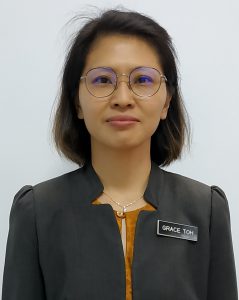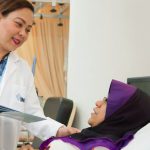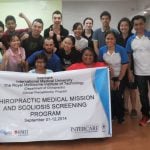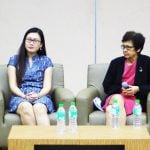At least one in every six Malaysians have diabetes, the cost of which amounts to more than just managing blood sugar. On average, a person needs to spend a minimum of four hours every day to manage diabetes.
“What we do in our daily life affects how quickly diabetes progresses. The daily activities of a person living with diabetes includes healthy eating, being more active, monitoring health goals, taking medication, problem solving, healthy coping, and reducing risks” said Dr Lee Ching Li, the Programme Director of an IMU postgraduate degree qualifying Diabetes Educators, at a workshop celebrating World Diabetes Day.
Diabetes is a chronic and progressive disorder that when poorly controlled, can cause complications that injure all organs in the body. For the individual living with diabetes, diabetes related complications can cost anywhere between RM3,880 to RM42,362 a year to treat. Since healthcare in Malaysia is subsidised, this translates to RM1.4 billion per year of costs incurred by the government. A multidisciplinary approach – where healthcare professionals from different disciplines work together to manage diabetes, can help address this disturbing problem. This sentiment is shared by Malaysian healthcare practitioners who are also alumni of the IMU Postgraduate Diploma in Diabetes Management and Education. Grace Toh Peik Khiam, a nurse and government servant working in Alor Setar said that “The multidisciplinary approach to diabetes care should happen at the primary, secondary and tertiary setting because the patient ultimately benefits. When managed right, a multidisciplinary approach supports patient-centred care”. Angela Teh Li Leng, a dietitian with a private medical hospital added that collaboration and good communication between the different disciplines involved is key to a successful team approach in managing diabetes. It was during their postgraduate journey that both identified ways to improve the care they provide to patients. Grace Toh reflected “As a nurse and diabetes educator, there are times when my patient needs a referral to other healthcare disciplines. I have also learnt that input from a different discipline can help me address the psychosocial needs of my patients who live with diabetes”. Grace realised this through the many patient case discussions she had with her course mates and lecturers. “My most memorable session was an online Problem Based Learning of in-patient care of diabetes. This session was facilitated by an Endocrinologist with course mates who were fellow nurses, dietitians, and pharmacists. With my nursing background, I had good peri-operative knowledge and experience, but this alone is not enough to manage the case. Input from the dietitian and pharmacist helped us optimise patient blood glucose control,” said Grace Toh.
Angela Teh also enjoyed the Problem Based Learning session and said that “It was fun breaking down the case study together with peers who were nurses, dietitians, and pharmacists. When the discussion was guided by the endocrinologist, I could see how the different disciplines can work together for the patient”. For Angela Teh, she also improved the way she provided diabetes education to the patients she sees daily. “I was able to hone my skills in patient education by upgrading theoretical knowledge on diabetes education and observing how my mentors and peers from the different disciplines provide diabetes education to patients,” said Angela.
Both Grace Toh and Angela Teh successfully completed their IMU postgraduate qualification as a Diabetes Educator amidst the COVID-19 pandemic. Their resilience was driven by a personal commitment to constantly improving what they do. A person can achieve excellence in their career through hard work, good strategies, and input from others.
Angela Teh shared that “I chose the IMU postgraduate programme because it has a good blend of theory and practical to support my pursuit of healthcare knowledge and skills. Balancing life, work and study is possible. One way to do this is to review the syllabus of the course before starting for better planning ahead”.
Sharing this growth mindset, Grace Toh added that “I would like to encourage healthcare providers to train as Diabetes Educators. Some healthcare providers may already have certificate level training in diabetes management.”

“Taking a postgraduate qualification in this area is a good top-up for the specialised care needed in diabetes management. You never know your capabilities until you test them. Continuing your education supports the ‘testing and retesting’ needed to improve the care we provide”.
| Path to Upskilling as a Diabetes Educator |
|---|
| Working adults in the healthcare sectors or fresh graduates with a keen interest in diabetes education have the opportunity upskill with a post-graduate degree at the IMU by either enrolling full-time in just 1-year or on a part-time basis within a 3-year period. Designed to suit working adults, this programme incorporates a multi-disciplinary approach to diabetes care in a blended learning model that includes both online and in-person learning. This delivery allows the student to make meaningful connections with the different healthcare disciplines involved in diabetes care. |











